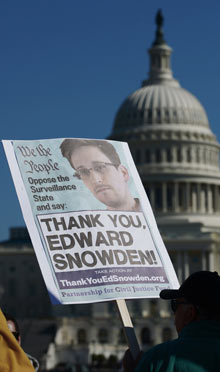Let’s Get This Class War Started
Hedges:
“The sooner we realize that we are locked in deadly warfare with our
ruling, corporate elite, the sooner we will realize that these elites
must be overthrown.”
Editor - Occupy is way ahead of Professor Hedges. Like where are
our Forces? The hundreds of earnest Occupiers? Their thousands of silver haired, well meaning supporters? Overthrow the US Army? With a couple of thousand earnest rebels? You are joking, Prof. Hedges. I hope.
“The rich are different from us,” F. Scott Fitzgerald is said to have
remarked to Ernest Hemingway, to which Hemingway allegedly replied,
“Yes, they have more money.”

The exchange, although it never actually took place, sums up a wisdom
Fitzgerald had that eluded Hemingway. The rich are different. The
cocoon of wealth and privilege permits the
rich to turn those around
them into compliant workers, hangers-on, servants, flatterers and
sycophants. Wealth breeds, as Fitzgerald illustrated in “The Great
Gatsby” and his short story “
The Rich Boy,” a class of people for whom
human beings are disposable commodities. Colleagues, associates,
employees, kitchen staff, servants, gardeners, tutors, personal
trainers, even friends and family, bend to the whims of the wealthy or
disappear. Once oligarchs achieve unchecked economic and political
power, as they have in the United States, the citizens too become
disposable.
The public face of the oligarchic class bears little resemblance to
the private face. I, like Fitzgerald, was thrown into the embrace of the
upper crust when young. I was shipped off as a scholarship student at
the age of 10 to an exclusive New England boarding school. I had
classmates whose fathers—fathers they rarely saw—arrived at the school
in their limousines accompanied by personal photographers (and at times
their mistresses), so the press could be fed images of rich and famous
men playing the role of good fathers. I spent time in the homes of the
ultra-rich and powerful, watching my classmates, who were children,
callously order around men and women who worked as their chauffeurs,
cooks, nannies and servants. When the sons and daughters of the rich get
into serious trouble there are always lawyers, publicists and political
personages to protect them—George W. Bush’s life is a case study in the
insidious affirmative action for the rich.
The rich have a snobbish
disdain for the poor—despite well-publicized acts of philanthropy—and
the middle class. These lower classes are viewed as uncouth parasites,
annoyances that have to be endured, at times placated and always
controlled in the quest to amass more power and money. My hatred of
authority, along with my loathing for the pretensions, heartlessness and
sense of entitlement of the rich, comes from living among the
privileged. It was a deeply unpleasant experience. But it exposed me to
their insatiable selfishness and hedonism. I learned, as a boy, who were
my enemies.

The
inability to grasp the pathology of our oligarchic rulers is one of our
gravest faults. We have been
blinded to the depravity of our ruling
elite by the relentless propaganda of public relations firms that work
on behalf of corporations and the rich. Compliant politicians, clueless
entertainers and our vapid, corporate-funded popular culture, which
holds up the rich as leaders to emulate and assures us that through
diligence and hard work we can join them, keep us from seeing the truth.
“They were careless people, Tom and Daisy,” Fitzgerald wrote of the
wealthy couple at the center of Gatsby’s life. “They smashed up things
and creatures and then retreated back into their money or their vast
carelessness, or whatever it was that kept them together, and let other
people clean up the mess they had made.”
Aristotle, Niccolò Machiavelli, Alexis de Tocqueville, Adam Smith and
Karl Marx all began from the premise there is a natural antagonism
between the rich and the masses. “Those who have too much of the goods
of fortune, strength, wealth, friends, and the like, are neither willing
nor able to submit to authority,” Aristotle wrote in “Politics.” “The
evil begins at home; for when they are boys, by reason of the luxury in
which they are brought up, they never learn, even at school, the habit
of obedience.” Oligarchs, these philosophers knew, are schooled in the
mechanisms of manipulation, subtle and overt repression and exploitation
to protect their wealth and power at our expense. Foremost among their
mechanisms of control is the control of ideas. Ruling elites ensure that
the established intellectual class is subservient to an ideology—in
this case free market capitalism and globalization—that justifies their
greed. “The ruling ideas are nothing more than the ideal expression of
the dominant material relationships,” Marx wrote, “the dominant material
relationships grasped as ideas.”
The blanket dissemination of the ideology of free market capitalism
through the media and the purging, especially in academia, of critical
voices have permitted our oligarchs to orchestrate the largest income
inequality gap in the industrialized world. The top 1 percent in the
United States own 40 percent of the nation’s wealth while the bottom 80
percent own only 7 percent, as Joseph E. Stiglitz wrote in “The Price of
Inequality.” For every dollar that the wealthiest 0.1 percent amassed
in 1980 they had an additional $3 in yearly income in 2008, David Cay
Johnston explained in
the article “9
Things the Rich Don’t Want You to Know About Taxes.” The bottom 90
percent, Johnson said, in the same period added only one cent. Half of
the country is now classified as poor or low-income. The real value of
the minimum wage has fallen by $2.77 since 1968. Oligarchs do not
believe in self-sacrifice for the common good. They never have. They
never will. They are the cancer of democracy.

“We
Americans are not usually thought to be a submissive people, but of course
we are,”
Wendell Berry writes.
“Why else would we allow our country to be destroyed? Why else would we
be rewarding its destroyers? Why else would we all—by proxies we have
given to greedy corporations and corrupt politicians—be participating in
its destruction? Most of us are still too sane to piss in our own
cistern, but we allow others to do so and we reward them for it. We
reward them so well, in fact, that those who piss in our cistern are
wealthier than the rest of us. How do we submit? By not being radical
enough. Or by not being thorough enough, which is the same thing.”
The rise of an
oligarchic state offers a nation two routes, according
to Aristotle. The impoverished
masses either revolt to rectify the
imbalance of wealth and power
or the
oligarchs establish a brutal
tyranny to keep the masses forcibly enslaved. We have chosen the second
of Aristotle’s options. The slow advances we made in the early 20th
century through unions, government regulation, the New Deal, the courts,
an alternative press and mass movements have been reversed. The
oligarchs are turning us—as they did in the 19th century steel and
textile factories—into
disposable human beings. They are building the
most pervasive
security and surveillance apparatus in human history to
keep us submissive.
This imbalance would not have disturbed most of our
Founding Fathers.
The Founding Fathers,
largely wealthy slaveholders, feared direct
democracy. They
rigged our political process to thwart popular rule and
protect the property rights of the native aristocracy. The masses were
to be kept at bay. The Electoral College, the original power of the
states to appoint senators, the disenfranchisement of women, Native
Americans, African-Americans and men without property locked most people
out of the democratic process at the beginning of the republic.
We had
to fight for our voice. Hundreds of
workers were killed and thousands
were wounded in our labor wars. The violence dwarfed the labor battles
in any other industrialized nation. The
democratic openings we achieved
were fought for and paid for with the blood of abolitionists,
African-Americans, suffragists, workers and those in the anti-war and
civil rights movements. Our radical movements, repressed and ruthlessly
dismantled in the name of anti-communism, were the real engines of
equality and social justice. The squalor and suffering inflicted on
workers by the oligarchic class in the 19th century is mirrored in the
present, now that we have been stripped of protection.
Dissent is once
again a criminal act. The Mellons, Rockefellers and Carnegies at the
turn of the last century sought to create a nation of
masters and serfs.
The modern corporate incarnation of this
19th century oligarchic elite
has created a worldwide neofeudalism, where workers across the planet
toil in misery while corporate oligarchs amass hundreds of millions in
personal
wealth.

Class struggle defines most of human history. Marx got this right.
The sooner we realize that we are locked in
deadly warfare with our
ruling, corporate elite, the sooner we will realize that these
elites
must be overthrown.
The corporate oligarchs have now
seized all
institutional systems of power in the United States.
Electoral politics,
internal security, the judiciary, our universities, the arts and
finance, along with nearly all forms of communication, are in corporate
hands.
Our democracy, with faux debates between two corporate parties,
is meaningless political theater. There is no way within the system to
defy the demands of Wall Street, the fossil fuel industry or war
profiteers.
The only route left to us, as Aristotle knew, is revolt.
It is not a new story. The rich, throughout history, have found ways
to subjugate and re-subjugate the masses. And the masses, throughout
history, have cyclically awoken to throw off their chains. The ceaseless
fight in human societies between the despotic power of the rich and the
struggle for justice and equality lies at the heart of Fitzgerald’s
novel, which uses the story of Gatsby to carry out a fierce
indictment
of capitalism. Fitzgerald was reading Oswald Spengler’s “The Decline of
the West” as he was writing “The Great Gatsby.” Spengler predicted that,
as Western democracies calcified and died, a class of “monied thugs”
would replace the traditional political elites. Spengler was right about
that.
“There are only two or three human stories,”
Willa Cather wrote, “and they go on repeating themselves as fiercely as if they had never happened before.”
The seesaw of history has thrust the oligarchs once again into the
sky.
We sit humiliated and broken on the ground. It is an old battle. It
has been fought over and over in human history. We never seem to learn.
It is time to grab our pitchforks.
Editor - Ha ha. Chris Hedges was kidding. Pitchforks? Ha ha.. But then, why urge revolt?
The SDS Weathermen revolted. Unconnected to the masses, the Weather people bombed and rebelled. The Corporate Media portrayed them as Terrorists. The masses did not know them.
They were hunted and jailed. Pointless. Other Columbia SDS went to work organizing workers against the War. Known as RYM II, these organizers caused 8 Wildcat walkouts in one year, and finally a long strike of an entire State's workers. (135,000).
Many people believe this is what needs to be done
now. Progressives need to begin building relationships with
Labor leaders.
They are reaching out to Progressives and Non Profits for support. We need to Welcome these mighty Union leaders. They have millions of Members. They are well-financed. They are being attacked by greedy Banks and the US Chamber of Commerce.













